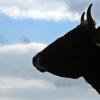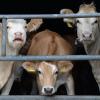Dozens of goats die on a farm in the Landsberg district

Apparently there were considerable violations of animal welfare regulations on a farm in the Landsberg district. As the veterinary office in the district office confirmed at the request of our editorial team, a large number of dead farm animals were discovered on the company. Only a smaller part of the inventory could be saved and brought into the emergency stable to Penzing.
With regard to data protection and the personal rights of the agricultural family, the head of the veterinary office, Dr. Michael Veith, and Wolfgang Müller, the spokesman for the district office, currently no more detailed information on the case. Officially, it is only said that 41 farm animals were removed on an agricultural company on an agricultural company due to animal welfare violations. A “at least high double -digit number” of animals had already died. The district office also leaves open which animal species it is. According to reports, it is about a milk goat operation. The case in the Landsberg district is likely to be the extent of similar events in the districts in the past few weeks Eichstätt and reach or even surpass Rosenheim.
In the Rosenheim district If 17 dead cattle, sheep and goats were found on a courtyard and around another about 20 were discovered under crap and straw, a few weeks later, nine dead cattle in another company, 19 could still be saved and were brought to Penzing. 18 dead cattle were found on a courtyard in the district of Eichstätt.
Photo: Thorsten Jordan
What are the consequences of the responsible animal owners
According to the veterinary office, the company in the Landsberg district has been inconspicuous in recent years. The authority became aware of the conditions there by an indication from the outside. Against the pet owners, it is now being investigated because of the suspicion of having added « to a vertebrate longer or repeating considerable pain or suffering », as stated in paragraph 17 of the Animal Welfare Act. If this suspicion is confirmed, the person responsible threatens a fine or a prison sentence up to three years. Due to the « significance » of the allegations, an animal keep or animal care ban is also in the room.
The statistics of the sanction measures that the veterinary office has taken in the past five years shows that the current case is unusual. According to this period, around 400 arrangements were issued to improve animal husbandry and to comply with animal welfare regulations. The veterinary office is responsible for around 700 agricultural cattle farmers in the district, but it also monitors private pet owners, dog breeders, cattle trade and cattle transport as well as slaughterhouses.
These are the biggest problem areas in livestock farming in the Landsberg district
The violations include a lack of supply of food and water and neglected care and veterinary care, which « in some cases also the death of animals or to order euthanasia because the animals could no longer be helped, » led. A problem area is also the non -species -appropriate attitude in overcrowded stables. Other points are inadequate hygiene, structural defects that recover injury risks for the animals, or lack or defective soaks, as well as deficits in ventilation and light. Defects are also regularly found in the area of pet and horse keeping outside of agriculture, according to chief veterinary Veith, such as illegal puppy trade or improper breeding.
Measures that go beyond notices are rare. Within five years, six animal husbandry bans were issued in the district and six criminal complaints were made, according to the statistics. Anyone who is proven with such a ban usually has a hard time keeping cattle again. Veith currently only knows of one case that someone was initially allowed to start at least a pasture for cattle from other farmers under conditions and with regular controls. In order to remove a ban on animal husbandry, numerous conditions must be met: the proof of the economy of a company, a psychological report that someone has changed their attitude, and the willingness to continue training names Veith as examples. After all, the authority is in the obligation that there is no reversal of animal welfare.
Often family problems lead to grievances in animal husbandry
A typical scheme that triggers dramas as currently triggers is not recognizable. « As a result, personal or social difficulties in families can often be assessed as far as the background that agricultural companies lose their animal husbandry from focus, » indicates Michael Veith. That is why the authority not only try to help the animals, but also to the owners, for example by referring to help from the agricultural professional association or the farmers’ association.
Photo: Maurizio Gambarini/dpa (symbol image)
There are no official veterinary control controls on farms. However, companies that receive government subsidies must count on so-called cross-compliance controls, in which it is checked whether the requirements to be observed are met. Indications of grievances also result from the findings of the milk test rings, eco-checks in organic farms or the number of animals that are brought to the animal body recycling from a farm, explains chief veterinarian Michael Veith. There are (as of 2024) 271 dairy farmers in the district of Landsberg, and are (also) fattened at 279 farms. In addition, 182 horses are counted and there are 79 farms that breed pigs or fattening. Supplies (62 companies), goats (15) and poultry (nine with more than 1000 animals) are of minor importance, according to the Office for Food, Agriculture and Forestry.
The chief veterinarian in the district office sees further need for action for animal welfare
The veterinary office is equipped with four state positions and a position that is financed by the district and filled with 4.75 jobs. The municipal office was created by the district council in 2021 because the tasks by the state staff « could not be partially covered », as the district office explains. According to the head of the office, the staff is still not sufficient. Reference is made to Baden-Württemberg: « Veterinary offices of similarly large and comparable structured counties in Baden-Württemberg have twice as many positions for official veterinarians compared to the Bavarian offices. »
Photo: Julian Leitenstorfer (archive)
Even after improvements in animal welfare in the past, Michael Veith sees other technically sensible opportunities for this: Instruments could be that before the start of animal husbandry, you have to prove your ability through a so -called « driver’s license » and – as in Scandinavia – veterinarians are obliged to notify animal welfare violations.











